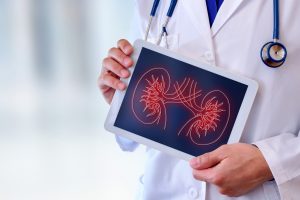The kidneys are two bean shaped organs in the body that help to filter waste products from the blood. They also help to regulate blood pressure.
People who have kidney disease should follow a diet that prevents the kidneys from losing their ability to function properly. It is important to maintain a diet low in sodium. This usually means less than 2,300 milligrams of sodium per day. Eating fresh foods is usually a healthier option due to a lower sodium content. Eat small portions of protein, 2 to 3 ounces, is a good amount.
Protein can come from fish, skinless chicken, lean meat, eggs, or dairy. Avoiding alcohol is also important. Heart healthy meals are a good choice. Avoid deep fried foods. Broiled or baked is a better option. Eat foods lower in phosphorous include vegetables, bread, pasta, rice, corn, and foods low in potassium apples, carrots, green beans, white bread, apple, grape, cranberries. It is also important to drink six to eight glasses of water a day.
Things to avoid when you have kidney disease are:
- Sodium
- Potassium
- Excess Protein
- Fast food
There a certain foods that help to keep the kidneys functioning well. These include:
- Cauliflower
- Blueberries
- Sea Bass
- Red Grapes
- Garlic
- Buckwheat
- Olive Oil
- Cabbage
- Bell peppers
- Arugula
- Macademia nuts
- Radish
- Turnips
- Pineapple
- Shiitake mushrooms
Speak to your physician if you are having kidney problems about the best choice of foods for you. You can schedule an appointment with a physician at Flushing Hospital Medical Center by calling 718-670-5486.
All content of this newsletter is intended for general information purposes only and is not intended or implied to be a substitute for professional medical advice, diagnosis or treatment. Please consult a medical professional before adopting any of the suggestions on this page. You must never disregard professional medical advice or delay seeking medical treatment based upon any content of this newsletter. PROMPTLY CONSULT YOUR PHYSICIAN OR CALL 911 IF YOU BELIEVE YOU HAVE A MEDICAL EMERGENCY.

